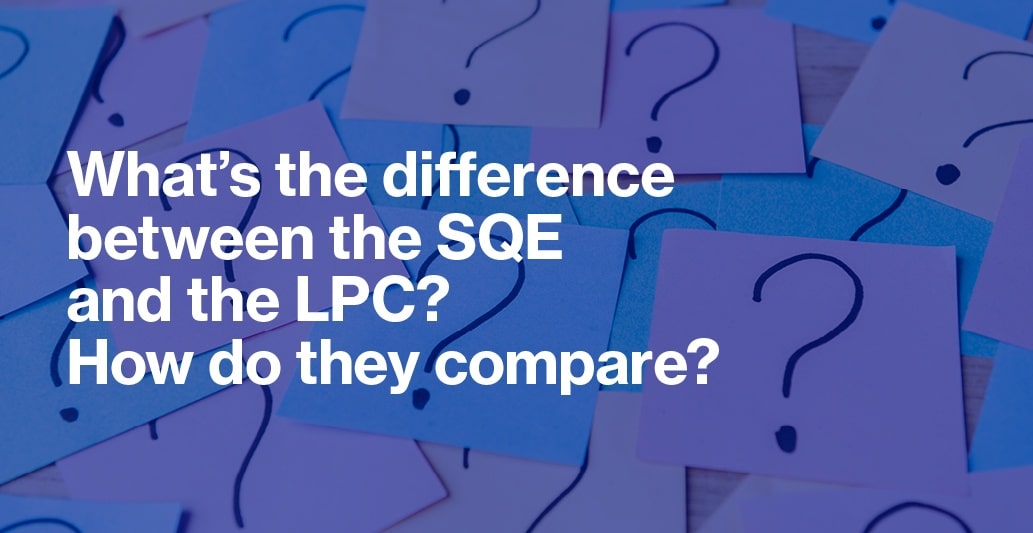
The introduction of the Solicitors Qualifying Examination (SQE) as the new route to qualification as a Solicitor has left some learners wondering – what is the difference between the SQE and the current main route to qualifying, the Legal Practice Course (LPC)?
To begin with, we should consider a brief overview of both the SQE and the LPC.
- The LPC is a postgraduate course, open to law graduates with an LLB, Chartered Legal Executives, those who have completed a Graduate Diploma in Law (GDL), or those who have completed a Common Professional Examination (CPE) following studies in an unrelated field.
- The newly introduced SQE replaces both the LPC and the GDL. From 1 September 2021, to qualify as a Solicitor in England and Wales you will need to meet four main requirements, with the SQE being one of these key elements. The SQE assessment has two stages – SQE1, which focuses on legal knowledge, and SQE2, which focuses on practical legal skills. You can find out more about the other three requirements here.
If you are already studying or training to become a Solicitor before the 1 September 2021, you can continue to qualify through the existing routes, or choose to do the SQE. If you choose to take the existing route, you will have until 31 December 2032 to qualify as a Solicitor through that pathway, as long as courses still remain available.
In order to make an informed decision about the pathway that best suits you, it is helpful to directly contrast the key differences between the SQE and LPC pathways.
1. You don’t need a degree to do the SQE
The LPC route requires non-LLB holders to complete either an additional GDL or CPE, however, the SQE allows for a greater deal of flexibility.
The SQE allows learners with a degree in any subject to qualify without the need to undertake an additional conversion course, therefore opening the door to those with no legal education background.
However, the SQE also goes one step further, as learners do not need to hold a degree at all – they can instead qualify by utilising a Level 6 degree-equivalent qualification in any subject.
2. The SQE is more affordable
The average cost of qualifying via the LPC route is £40,750 – not taking into account living expenses. Through the SQE route, aspiring Solicitors are not required to complete an LLB, or even a degree. The ability to utilise a degree equivalent qualification, for example the CLC Level 6 Diploma in Law and Practice, enables learners to qualify via the SQE route from as little as £15,560, from the beginning of your studies to the point of applying to qualify as a Solicitor.
You can find a more detailed breakdown and comparison of the costs of qualifying here.
3. Qualifying Work Experience (QWE) vs. training contract
The SQE route requires completion of Qualifying Work Experience (QWE), whereas the LPC route requires aspiring Solicitors to complete a training contract in order to qualify.
For the year 2019-20, the Law Society revealed that, whilst 20,905 UK students were accepted to study law at undergraduate level in England and Wales, only 6,344 new training contracts were registered with the Solicitors Regulation Authority (SRA). This illustrates just how competitive applying for ellusive training contracts is.
Training contracts are limited two-year placements, normally carried out in a single law firm, and they see aspiring lawyers progress through at least three areas of work at the law firm (known as seats). Trainees must complete a contentious and non-contentious seat, and also undertake a Professional Skills Course (PSC).
In contrast, the SQE QWE requirement is much more flexible. QWE can be completed before, alongside, or after a candidate’s SQE studies and examinations and needs to equate to two years full time equivalent.
However, QWE does not need to be one continuous two-year period – it can also be completed in stages and in up to four different organisations. There are a wide range of organisations in which QWE can be carried out, including law firms, law clinics, in-house, or not for profit organisations. The organisation does not need to be registered or regulated by the SRA, and the work itself can be paid or unpaid.
QWE must be confirmed by a Solicitor, though they do not need to hold a practising certificate to do so, and in a law firm, it could be the Compliance Officer for Legal Practice (COLP) who signs off on your QWE. Individuals can also choose to complete a traditional training contract if they still wish to – this will count as QWE. You can find out more about QWE in our online guide.
4. The SQE is standardised
The Solicitors Regulation Authority (SRA) competence statement sets out the rules that Solicitors should follow and provides everyone with clear guidance of what to expect from a Solicitor. This is what the SQE assessments tests. Whilst most LPCs are quite similar, the SQE ensures a standardised assessment. Every applicant must pass the same rigorous assessment in order to qualify, as the exams are regulated by SRA, and are set by one provider (Kaplan). This means that the exams’ content and/or difficulty does not vary from provider to provider, which was formally the case with the LPC.
5. The LPC aims to bridge the gap between theory and practice – the SQE assesses both
As mentioned above, the LPC is a course which is designed to be taken following completion of your LLB or GDL/CPE to bridge the gap between legal theory and legal practice prior to, or alongside, the completion of a training contract. The SQE, however, is a means of assessing both your functioning legal knowledge and your ability to apply this knowledge in practice assessed at the level of a newly qualified solicitor. Alongside the completion of qualifying work experience, there are SQE Prep courses which are designed to prepare learners for the SQE by equipping them with the knowledge and skills they need to sit the SQE assessments. Find out more about Law Training Centre’s SQE1 Prep and SQE2 Prep courses.

